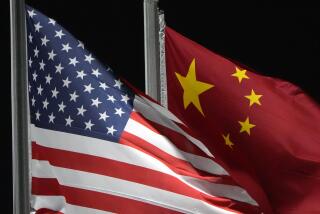Boeing, Hughes to Pay $32 Million for Helping China With Technology
WASHINGTON — Boeing Co. and Hughes Electronics Corp. agreed Wednesday to a $32-million settlement to resolve allegations that Boeing’s El Segundo satellite unit illegally provided China with sensitive space technology in the mid-1990s.
Hughes owned the satellite business at the time of the violations; Boeing owns the operation now.
Ending a bitter and drawn-out dispute, Boeing and Hughes will pay the State Department $20 million in cash over seven years. They also will spend $8 million internally to bolster their export compliance programs. Boeing was credited with $4 million it already has spent on strengthening its internal controls.
Boeing spokesman Dan Beck said that about $15 million of the fine would be paid by Hughes, with Chicago-based Boeing responsible for the remaining $5 million.
Analysts said the settlement is not expected to have any material effect on either company and clears a cloud that had hung over the troubled satellite business for nearly a decade.
Hughes and Boeing “acknowledge the nature and seriousness of the offenses charged by the Department of State, including the harm such offenses could cause to the security and foreign policy interests of the United States,” said a statement by Hughes President Jack Shaw and Dave Ryan, Boeing’s general manager for the satellite unit.
The companies were facing as much as $60 million in fines, and Boeing could have been barred from selling some satellite technology overseas for three years. Such a prohibition would have been particularly painful given that the commercial satellite industry faces low demand.
“By putting it behind them it opens up some potential business with China again,” said Marco A. Caceras, a satellite expert with Teal Group Corp., an aerospace research firm in Fairfax, Va. “In a stagnant market, anything like this is good news.”
Boeing acquired the satellite manufacturing business in 2000 from Hughes for $3.7 billion. Hughes, headquartered in El Segundo, owns satellite television provider DirecTV.
The government alleged that Hughes and another satellite company, Loral Space & Communications Ltd., failed to obtain permission from the State Department before helping Chinese engineers figure out why Chinese rockets blew up during launches in 1995 and 1996. The rockets were carrying satellites built by Hughes and Loral.
The State Department alleged that the companies transferred rocket technology that could have helped the Chinese develop ballistic missiles.
Loral agreed last year to pay a $14-million fine and spend $6 million on compliance with export-control laws, but Hughes and Boeing continued to dispute the allegations.
After lengthy discussions, the State Department increased the pressure on Hughes and Boeing in December by issuing a “charging letter” and put the case before an administrative judge. The department outlined 123 alleged violations of military export rules. For instance, the letter said, Hughes executives helped China repair a launch facility and analyzed telemetry data from a failed launch.
In their statement Wednesday, Boeing and Hughes admitted many of the violations and said they “accept full responsibility and express regret for not having obtained licenses that should have been obtained.”
Boeing previously maintained that Hughes was solely responsible for resolving the case and would have to pay any fines and penalties. “We’re delighted to have this behind us,” Beck said.
In New York Stock Exchange trading Wednesday, Boeing closed at $26.74, down 71 cents, while Hughes was unchanged at $9.83.
More to Read
Inside the business of entertainment
The Wide Shot brings you news, analysis and insights on everything from streaming wars to production — and what it all means for the future.
You may occasionally receive promotional content from the Los Angeles Times.










